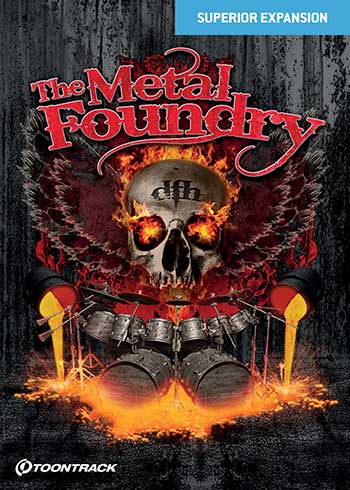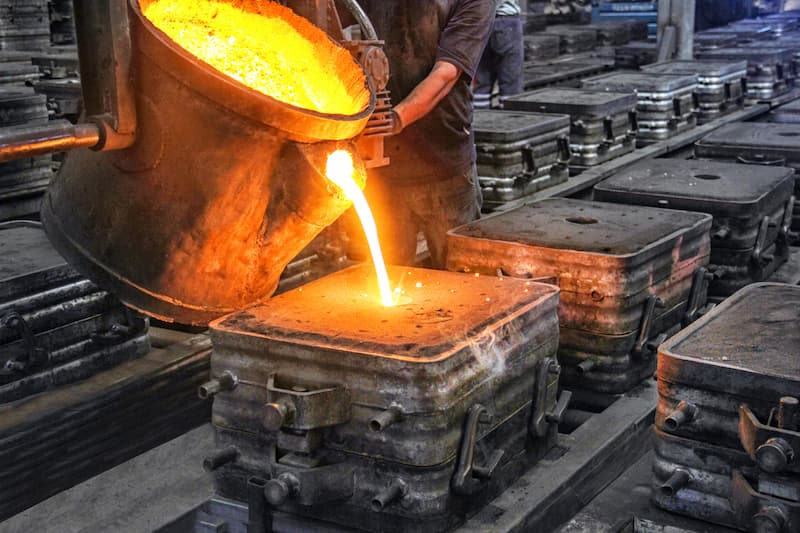Breaking Down the Aluminum Casting Process: How It Works
Wiki Article
A Comprehensive Guide to Metal Casting: Benefits and Providers Supplied by Foundries
Metal casting is an essential process in different markets, offering countless benefits with the solutions of factories. These facilities transform molten metal into specific and sturdy elements, satisfying specific customer requirements. By employing advanced innovations, shops ensure high quality and performance in manufacturing. Nevertheless, the intricacies of metal casting and the diverse strategies entailed increase important concerns concerning its role in contemporary production. What developments exist in advance in this crucial field?Comprehending the Metal Casting Process
The metal casting procedure is a basic strategy made use of in making to develop complicated forms and elements. This method involves putting molten metal right into a mold and mildew made to create the preferred item. The process begins with pattern creation, which acts as a design template for the mold. Aluminum Foundry. Numerous products, such as sand, metal, or ceramic, are utilized for mold-making, relying on the certain demands of the casting
Once the mold and mildew is prepared, molten metal is put right into it and permitted to cool down and solidify. After solidification, the mold is gotten rid of, disclosing the cast part. Numerous methods, consisting of sand casting, investment casting, and pass away casting, are utilized, each matched to various applications and materials. Quality assurance procedures, such as evaluations and testing, are important to ensure the end product meets requirements. Generally, the metal casting process plays a crucial role in generating parts for sectors ranging from automotive to aerospace.
Trick Advantages of Metal Casting
Metal casting uses significant advantages that make it a preferred production method in different industries. Its style adaptability and precision permit complex forms, while economical mass production improves efficiency. Additionally, the convenience and strength of materials made use of in casting add to the sturdiness of the last products.Style Versatility and Accuracy
Releasing amazing layout adaptability and precision, metal casting enables designers and developers to create detailed shapes and features that would be difficult or challenging to accomplish with other producing approaches. This capacity enables the production of complex geometries, inner structures, and fine details that enhance product performance and aesthetics. Additionally, different casting strategies, such as sand casting, financial investment casting, and pass away casting, offer further choices for personalization, suiting varied product homes and job demands. The versatility of molds permits modifications throughout the layout stage, enhancing the change from idea to end product. Ultimately, metal casting stands out for its ability to supply high-precision parts, making it an invaluable procedure in sectors varying from vehicle to aerospace and past.Economical Automation
Cost-effective automation stands as one of the key benefits of metal casting, allowing makers to generate big quantities of parts at a reduced expense each. This performance emerges from the capability to create detailed mold and mildews that can be reused numerous times, significantly decreasing setup and functional costs. In addition, metal casting processes, such as sand casting and die casting, permit for high throughput, making it possible to fulfill the demands of large production runs. The reduced product waste and power intake even more boost expense savings, making metal casting an attractive option for markets requiring bulk components. Overall, the cost-efficient nature of metal casting settings it as a preferred technique for manufacturers intending for economic performance in their production procedures.Material Convenience and Stamina
Among the standout attributes of metal casting is its amazing product versatility, which enables the use of a vast array of metals and alloys. This flexibility enables producers to pick materials that finest match their particular applications, from light weight aluminum and bronze to iron and steel. Each metal uses distinct homes, consisting of differing levels of strength, rust resistance, and thermal conductivity. Metal casting can produce components that satisfy rigid efficiency needs throughout diverse industries, such as automobile, aerospace, and building. Furthermore, the toughness of actors steels can be enhanced through different treatment procedures, making certain toughness and long life. Metal Casting. On the whole, the combination of material adaptability and integral strength makes metal casting a favored selection for producing top notch componentsSorts Of Metal Casting Techniques
Metal casting encompasses a variety of methods that accommodate various manufacturing demands and product residential properties. Usual techniques include sand casting, which uses a sand mold and mildew for intricate forms, and financial investment casting, known for its accuracy and surface finish. Die casting is one more method that utilizes high-pressure shot of molten metal right into mold and mildews, perfect for automation of tiny parts.Shell molding offers a faster alternate, utilizing a resin-coated sand to produce thin-walled mold and mildews, while lost foam casting enables elaborate styles without the need for a core.
Furthermore, continuous casting is used for generating long areas of metal, such as sheets or bars, by solidifying molten metal in a continual process. Each method offers distinct benefits and is selected based on variables like the needed detail, production quantity, and material type, making certain remarkable end results in metal construction across numerous sectors.
The Function of Foundries in Metal Casting
Foundries play a crucial role in the metal casting procedure, working as the facilities where molten metal is changed into completed items. These specialized facilities are furnished with the necessary tools and innovations to take care of various metals, guaranteeing top quality end results. Foundries are in charge of numerous vital features, including melting the metal, putting it right into mold and mildews, and allowing it to solidify.Furthermore, they keep rigorous safety and environmental requirements to secure employees and minimize ecological effect. Knowledgeable technicians and engineers work together to enhance casting procedures, boosting efficiency and reducing waste. Foundries also participate in high quality control steps, guaranteeing that the final items fulfill specific tolerances and specs. This quality control is vital for markets that count on exact elements, such as vehicle and aerospace. Consequently, factories add substantially to the overall manufacturing landscape, allowing advancement and development across various sectors.
Customized Metal Casting Services
Custom metal casting solutions use tailored design services that satisfy specific client needs. These solutions also provide product option expertise, ensuring the right metal is picked for the wanted application. Such adaptability and understanding enhance the overall top quality and efficiency of the last product.
Customized Design Solutions
Tailored style remedies in metal casting provide producers with the versatility to produce parts this contact form that fulfill specific performance and aesthetic needs. Shops supply customized services that allow clients to specify dimensions, forms, and surface area coatings to attain wanted outcomes. This customization process typically consists of cooperation between developers and designers, guaranteeing that the final items straighten with functional needs and industry requirements. Advanced innovations, such as computer-aided layout (CAD) and simulation software program, enable accurate modeling and testing of elements before manufacturing, boosting and minimizing mistakes efficiency. By leveraging customized style options, organizations can maximize performance while decreasing waste and costs, inevitably bring about an extra one-upmanship on the market. This flexibility is essential for sectors needing distinct applications and specifications.Product Choice Knowledge
When selecting products for metal casting, competence plays a vital role in ensuring that the appropriate option aligns with both efficiency requirements and cost-effectiveness. Shops utilize experienced specialists who understand the residential or commercial properties of numerous metals and alloys, enabling them to recommend ideal products for certain applications. Aspects such as stamina, corrosion resistance, and thermal conductivity are carefully considered to fulfill the client's demands. Furthermore, industry trends and innovations in material science notify these choices, allowing shops to stay affordable. By leveraging their knowledge, factories can assist customers in steering via complicated material alternatives, ultimately bring about enhanced item top quality and decreased manufacturing costs. This customized knowledge is crucial for achieving successful end results in personalized metal casting services.High Quality Control in Metal Casting
Quality assurance in metal casting is crucial to guarantee that the end products meet the needed specs and efficiency criteria. Foundries utilize a range of techniques and methods to guarantee the best of actors elements. This procedure starts with rigorous product evaluations, confirming that raw materials abide by industry standards. Throughout the casting procedure, real-time monitoring and screening are performed to analyze parameters such as temperature, mold integrity, and dimensional precision.
Applications of Metal Castings Across Industries
Metal spreadings play a vital role in numerous industries, functioning as the backbone for numerous applications. In the automobile market, cast elements such as engine blocks and transmission click now real estates are needed for lorry efficiency and reliability. The aerospace industry depends on accuracy castings for critical components that assure security and efficiency in trip. In addition, the construction market uses metal castings for fixtures, fittings, and structural aspects, boosting the toughness of structures and infrastructure.Furthermore, the energy sector take advantage of castings made use of in generator blades and other equipment necessary for power generation - Aluminum Foundry. The medical area also makes use of metal castings in devices and instruments, demonstrating the versatility of this manufacturing process. In general, metal castings are essential to the performance and innovation of varied fields, showcasing their relevance in modern innovation and framework growth
Often Asked Concerns
What Materials Are Typically Utilized in Metal Casting?
Typical materials used in metal casting include aluminum, iron, steel, brass, and bronze. Each product uses distinct residential properties appropriate for numerous applications, enabling producers to choose the best alternative based upon stamina, weight, and rust resistance.How much time Does the Metal Casting Process Usually Take?
The metal casting procedure normally takes a number of hours to a couple of days, relying on elements such as the intricacy of the design, sort of metal Homepage used, and the details casting method utilized by the factory.
What Is the Environmental Effect of Metal Casting?
The environmental influence of metal casting includes power consumption, discharges, and waste generation. Foundries usually execute measures to alleviate these effects, such as recycling products and utilizing cleaner modern technologies to decrease their eco-friendly footprint.Can Metal Casting Be Provided For Small-Scale Projects?
Metal casting can indeed be done for small jobs. Different factories accommodate such requirements, providing customized options that accommodate restricted manufacturing runs while keeping quality and precision in the end products.What Are the Precaution in Metal Casting Foundries?
In metal casting shops, precaution consist of personal safety devices, proper air flow, training on devices use, emergency situation treatments, routine upkeep checks, and adherence to market safety requirements to decrease threats connected with molten metal and dangerous materials.Additionally, metal casting procedures, such as sand casting and pass away casting, enable for high throughput, making it possible to satisfy the demands of massive production runs. One of the standout characteristics of metal casting is its amazing product adaptability, which allows for the usage of a broad array of alloys and metals. Additionally, continual casting is used for producing lengthy sections of metal, such as sheets or bars, by strengthening molten metal in a continual process. Foundries play a crucial function in the metal casting procedure, offering as the facilities where liquified metal is transformed right into finished items. Typical materials made use of in metal casting include aluminum, iron, bronze, steel, and brass.
Report this wiki page